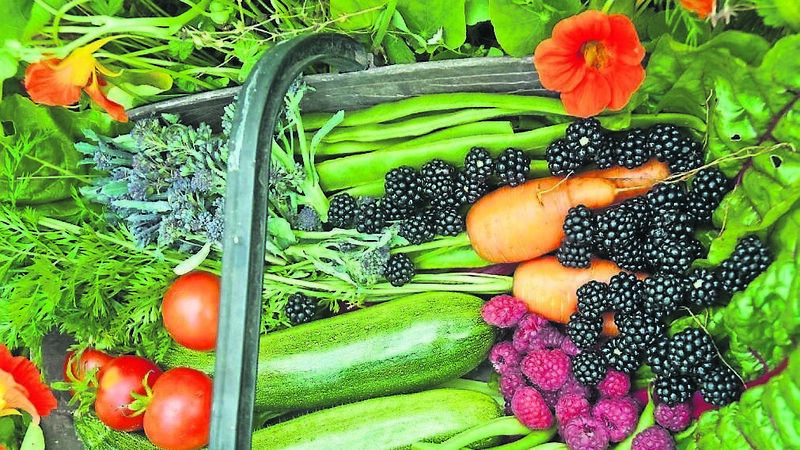Cork Views: How we can cut food bills AND get healthier

Fruit and vegetable vouchers are one idea that can lead to a healthier population
The cost of food is rising at almost three times the rate of general inflation.
Provisional inflation figures for July from the Central Statistics Office show the cost of food is increasing sharply with prices estimated to have risen 4.6% over the last year.
At the same time, almost half our shopping baskets are stuffed with ultraprocessed food – often layered with salt, fat, sugar and additives. Fibre and nutrients have been squeezed out to prolong shelf life and preserve taste.
The result is that about a quarter of the population in Ireland are living with obesity. That’s 1.2 million people. Yet we are loathe to attack this head-on with policies that would facilitate people eating healthy food, prolong life, and preserve physical and mental wellbeing.
We are happy to challenge this narrative with profit-driven pharmaceuticals, but not with measures that might have an impact on the soaring profits of the food industry.
But surely the number one priority of government policy should not be soaring profits but the health and wellbeing of its people.
If I was a Cabinet member concerned about obesity, chronic disease and overwhelmed health services, this is what I would bring to the table.
Public eateries
It takes a leap of faith to imagine a future where the dominance of junk food and take-aways has vanished, replaced by public restaurants owned by communities serving hot healthy food that doesn’t break the bank. Impossible? It’s been done before.
During World War II, the UK government opened more than 2,000 British restaurants, serving 600,000 affordable meals a day, designed to meet a third of people’s energy needs.
As well as food provision, diners could be co-designed to fulfil the social functions of food including dignity, cultural meaning and enjoyment. And they could reduce the burden of domestic food work including the planning, shopping, cooking and washing, all of which is increasingly costly and still strongly gendered.
Public diners would require public investment. But because they serve a lot of food a day, costs could be kept at a minimum while maintaining quality.
Imagine public infrastructure in Ireland that dispensed with fast food takeaways and facilitated public eateries where people of all backgrounds could access nutritious food at affordable prices in their own communities.
This concept is already running in several countries. Turkey have 17 public restaurants in Istanbul. For a small sum, hot meals based on staples – soup, legumes, rice, vegetables and meat - are served to anyone who walks in.
Mexico City’s 500 community-backed kitchens operate as neighbourhood cafes serving hot, healthy meals that are affordable while community bonding builds. The scheme feeds over half a million people every day.
Nourish Scotland is hoping to pilot a similar scheme in Dundee, and Nottingham in 2026. Project Officer at Nourish Scotland, Abigail McCall said: “For other aspects of our wellbeing – water, transport, healthcare, even WiFi - we have built the public infrastructure to ensure that everyone has quality. We are missing that in relation to food.”
It’s a brilliant model that could transform community health and wellbeing.
Fruit and vegetable vouchers
About a third of adults in Ireland consume the World Health Organisation recommendation of five or more fruits and vegetables a day. Because they are costly, and have a limited shelf life, this figure is skewed towards the well-off.
At the same time, demand for GP services continues to escalate beyond the capacity of the healthcare service’s ability to cope.
A recent report on GP supply and demand in Ireland by the Economic and Social Research Institute, found that GP retirements in several counties will put services at risk where there is no viable replacement for them.
It is predicted that GP visits will increase by as much as 30% in the next 15 years, with an extra 1,200 doctors needed to keep pace.
Meanwhile, a pioneering ‘Fruit and Veg on Prescription’ project in the UK showed providing fruit and vegetables free to low income groups improved physical health in 80% of participants and cut GP visits by 15%, and 75% met their ‘five a day’ target after nine months compared to 32% at the start of the project.
In addition, 54% of participants experienced improved mental health, attributed to their need to worry less about money for food – and feeling more supported in their community.
Now, the Alexandra Rose Charity is encouraging local authorities and healthcare leaders to take note of the scheme’s success and consider adopting similar models to support healthier, more resilient communities.
CEO Jonathan Pauling said the programme shows how a small change, such as access to fruit and veg can transform lives - improving health, reducing isolating and building community. He said ‘Fruit and Veg on Prescription’ should be used “as a national blueprint for success and rolled out on a national sale to support those affected by poor diet”.
Fruit and vegetables are not as trendy nor have the astronomical profit margins seen by Big Pharma with weight loss treatments. Yet, the robust evidence behind their ability to improve health and wellbeing, reduce the risk of chronic disease and demand for health services, suggest it is time to consider a pilot rollout of a similar scheme in Ireland.
Cooking classes for teens
Every teen should know how to cook. Teen cooking camps can take young people from baked beans to brilliance, teaching them the essentials of cooking in a couple of lessons – an intensive week-long course in the summer or a couple of hours once a week in school term.
Private cookery classes are available for teens across the country and while popular are costly - available only to the privileged few who are likely least in need.
A really good public course would include basics like how to bake bread, make a good seasonal soup, roast a chicken with all the trimmings, make a fruit salad or a salad dressing from scratch, for instance.
All the above are about more than just money or health as we are reminded of what we have lost. We are allowed to fall in love with real food all over again as we relish the prospect of eating together; nourishing bodies and minds and souls; and creating lasting memories.







 App?
App?




